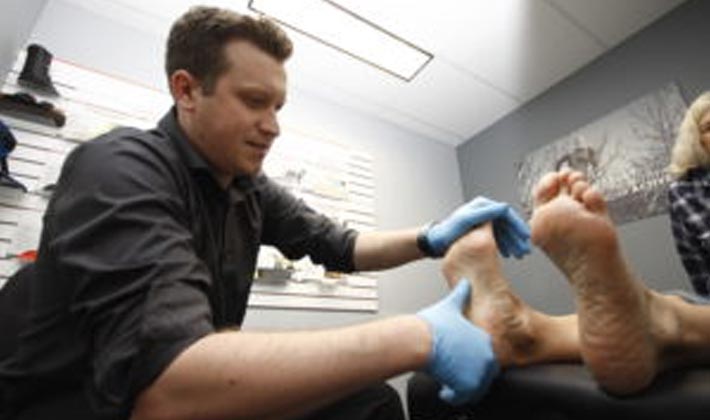If you’re experiencing foot numbness, loss of feeling or stabbing/burning pain in your hands and feet, you may have peripheral neuropathy. Peripheral neuropathy – damage to the peripheral nerves outside of your brain and spinal cord – is a condition Canadian Certified Pedorthists see frequently as it can have a significant impact on the health of your feet, mobility, as well as lead to foot numbness and nerve pain.
Individuals who have foot numbness or peripheral neuropathy are at increased risk of falling as the lack of sensation, loss of coordination and muscle weakness make it more difficult to move around safely. They’re also at increased risk of serious foot wounds and ulcers as the reduced sensation makes it difficult to feel a small injury developing. Left unnoticed a small rub, blister or nick can quickly become a difficult to treat wound.

Although peripheral neuropathy is commonly caused by diabetes there are a wide variety of other causes including: traumatic injuries, alcoholism, vitamin deficiencies, exposure to toxic substances, infections, diseases, genetics and more. If you have any of these risk factors and are experiencing any of the symptoms above, consult your family doctor and add a Canadian Certified Pedorthist to your healthcare team.
If you have peripheral neuropathy, these safety tips will reduce your risk of developing a serious foot wound or having an accidental fall:
• Inspect your feet daily for abnormal redness, rubs or blisters. If you have trouble bending, use a small mirror to inspect the bottom of your feet.
• Always wear properly-fitted, supportive footwear. Footwear that is too tight will pinch, restrict blood flow and cause blisters and irritations. Footwear that is too loose is a tripping hazard.
• Book a consultation with a Canadian Certified Pedorthist. Your Pedorthist will do a full assessment and determine if you require foot orthotics or different footwear to ease the pressure on sensitive areas of your feet.
• Avoid putting hot water bottles on your feet and always check the temperature of your bath with your elbow before getting in.
• To protect your feet, wear shoes indoors and outdoors; avoid slippers inside your home. Purchase a pair of supportive, well-fitting shoes for use at home.
• Keep moving. Exercise regularly and avoid sitting down for long periods of time.
As with many healthcare issues, foot numbness and peripheral neuropathy requires the support of your full healthcare team; working closely with your family doctor and Pedorthist will ensure you stay healthy and can continue to participate in all the activities you enjoy.
By Alyssa Milton, C. Ped (C), Cambridge, ON
